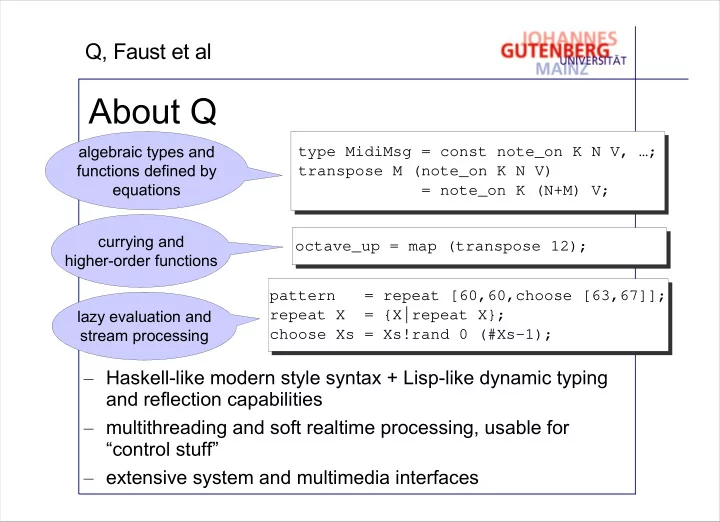

Q, Faust et al About Q algebraic types and type MidiMsg = const note_on K N V, …; functions defined by transpose M (note_on K N V) equations = note_on K (N+M) V; currying and octave_up = map (transpose 12); higher-order functions pattern = repeat [60,60,choose [63,67]]; repeat X = {X|repeat X}; lazy evaluation and choose Xs = Xs!rand 0 (#Xs-1); stream processing – Haskell-like modern style syntax + Lisp-like dynamic typing and reflection capabilities – multithreading and soft realtime processing, usable for “control stuff” – extensive system and multimedia interfaces
Q, Faust et al Multimedia: Q Library MidiShare , Faust, Pd, C/C++ PortAudio , OSC/SC3 , OpenGL, OpenAL, Xine Q-SWIG Standard Library: Q Interpreter rational numbers, Scientific lists, streams, programming: containers, ... Octave, OpenDX, Graph library POSIX: I/O, GUI+Graphics: processes, Web+Databases: Tcl/Tk, Gnocl, threads, sockets, Apache module, GGI, ImageMagick regexps, ... XML+XSLT, Curl, ODBC, SQLite
Q, Faust et al Q Q- Pd/Q OSC/SC3 interface interface Q-Faust interface Pure Data SuperCollider q.cpp Faust puredata. supercollider. cpp cpp
Q, Faust et al Direct Faust Interface faust -a q.cpp && c++ .dsp source .so plugin faust_init Q-Faust FaustDSP object faust_compute faust_info get, put control data audio data UI description
Q, Faust et al A Simple Faust Organ // control variables vol = nentry("vol", 0.3, 0, 10, 0.01); // % attack = nentry("attack", 0.01, 0, 1, 0.001); // sec decay = nentry("decay", 0.3, 0, 1, 0.001); // sec sustain = nentry("sustain", 0.5, 0, 1, 0.01); // % release = nentry("release", 0.2, 0, 1, 0.001); // sec freq = nentry("freq", 440, 20, 20000, 1); // Hz gain = nentry("gain", 1.0, 0, 10, 0.01); // % gate = button("gate"); // 0/1 // additive synth: 3 sine oscillators with adsr envelop process = (osc(freq)+0.5*osc(2*freq)+0.25*osc(3*freq)) * (gate : adsr(attack, decay, sustain, release)) * gain * vol;
Q, Faust et al Q → Faust Example def [FREQ,GAIN,GATE] = map (CTLD!) ["freq","gain","gate"]; map MIDI note freq N = 440*2^((N-69)/12); numbers and gain V = V/127; velocities play N V = put FREQ (freq N) || put GAIN (gain V) || put GATE 1; damp = put GATE 0; start and stop a note process (note_on _ N V) = play N V if V>0; = damp if not isnum (get FREQ) or else process MIDI (freq N = get FREQ); messages midi_loop = process (midi_get IN) || midi_loop;
Q, Faust et al SuperCollider Architecture realtime non-realtime Main Application Network Thread Thread scsynth sclang TempoClock Audio Thread Scheduler Threads Transport Layer I/O Threads Non-Realtime Thread (OSC, MIDI, ...)
Q, Faust et al SuperCollider Interface .dsp source .dsp.xml file faust2sc faust -xml -a faustsc.q supercollider.cpp && FOrgan : MultiOutUGen c++ { ... } synth definition .sc class file SynthDef("organ",...) sclang .so plugin SC language scsynth SC sound server
Q, Faust et al Q → SC → Faust Example SuperCollider SynthDef("organ", { arg gate = 0, freq = 440, gain = 0.3, vol = 1.0; var sig; sig = FOrgan.ar(gate: gate, freq: freq, vol: vol); Out.ar(0, Pan2.ar(sig, 0, 1)); }) Q n_set ARGS = sc_send (osc_message "/n_set" ARGS); play I N V = n_set (I,"freq",freq N,"gain",gain V, "gate",1); damp I = n_set (I,"gate",0);
Q, Faust et al Pd Interface .dsp source faust -xml -a puredata.cpp && c++ .pd_linux plugin .dsp.xml file faust2pd .pd file Pd
Q, Faust et al Conclusion – Faust makes developing DSP modules for different environments easy – Q+Faust together with a realtime engine (SC3, PD, ...) gives you a complete functional programming environment for interactive computer music applications – TODO: high-level Q API for algorithmic composition
Recommend
More recommend